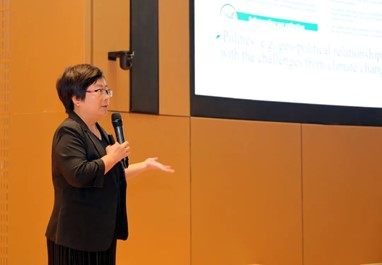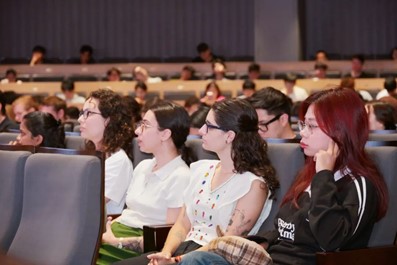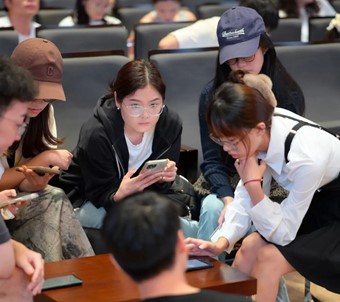What makes this course a hit among students from all over the world?
"As a CEO, would you consider carbon emissions when launching a new product?"
"Why do some overseas companies think they have a great product but fail to win over local consumers?"
"Why is it important to pursue carbon neutrality and sustainable development?"
In the Zero-Carbon Innovation and Strategy class, Professor JIN Junsparked deep reflections on global climate change among over 200 students through a series of thought-provoking questions.
In its second year, this course quickly became one of the most popular on campus, attracting students from over 20 different colleges, including many international students. What is the secret behind its appeal?

A cross-disciplinary journey
Since the course began, Professor JIN has been focused on engaging students from diverse disciplines and ensuring they gain practical knowledge. She achieved this through interdisciplinary collaborations with faculty from colleges such as energy engineering, environmental science, and resources.
In class, Professor JIN explained the basics of zero-carbon and related policies, using real-world scenarios to guide students' thinking. "As a faculty member in the School of Management, I aim to inspire students to explore zero-carbon innovation and entrepreneurial opportunities at the intersection of management and other disciplines, and contribute to carbon neutrality and sustainable development through innovation or entrepreneurship," she said.

To spark students' interest, Professor JIN incorporated the latest interdisciplinary research findings, dissecting recent zero-carbon hot topics from multiple angles, including the products involved, companies' innovative strategies, and the evolving international situation.
"Professor JIN's class is very cutting-edge, and the cases she discusses are closely related to our daily lives. She made me realize that I can also contribute to achieving carbon neutrality," said YUZHOU Yixiong, a master's student from the College of Agriculture and Biotechnology, who expressed his admiration for the course after attending.
Global minds, one classroom
"Regardless of their discipline or country students come from, all students need to maintain a zero-carbon mindset. This issue encompasses global environmental protection, the implementation of national carbon strategies, and business expansion overseas, as well as students' career development and social responsibility," said Professor JIN.
In this course, Professor JIN taught entirely in English, creating a platform for students from diverse cultural backgrounds to communicate. Students from various countries shared their perspectives, and cross-cultural interactions enhanced their sense of responsibility in tackling global climate issues.
I really appreciate the international aspect of this course. Professor Jin's English instruction allowed students from different countries and disciplines to interact. It made me realize that addressing carbon emissions is a global effort, said Aik Ling, a 2025 student from the School of Management.

Moreover, Professor JIN organized two special workshops, inviting industry experts to share the latest zero-carbon practices. This gave students the opportunity to actively participate in the strategy-making process for carbon neutrality.
Cross-Disciplinary Climate Action
Every new international product must undergo a carbon emissions assessment to ensure it is environmentally friendly and complies with local policies. This calls for a constant zero-carbon mindset and the use of interdisciplinary strengths to reduce emissions through innovation and entrepreneurship, thus promoting sustainable development.

Professor JIN's course enhances students' understanding of carbon neutrality, encouraging them to explore the connection between digital transformation and zero-carbon initiatives. It equips them to tackle carbon emissions through innovation and entrepreneurship while fulfilling their social responsibilities. In doing so, students can advance their careers, support the international expansion of Chinese enterprises, and contribute to global climate efforts.
Adapted and translated from the article written by DUAN Ting
Translator: LU Yihsuan ('28, Literature)
Photo: LOUFU Yicheng
Editor: HAN Xiao





